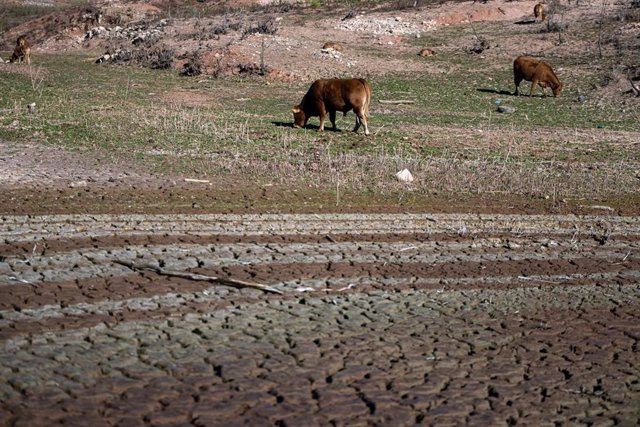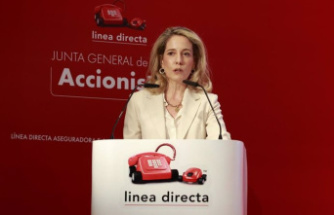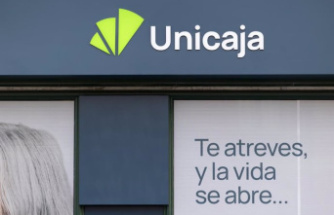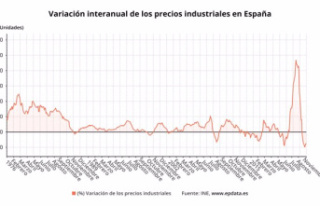VALLADOLID, 26 Dic. (EUROPA PRESS) -
The UPA-COAG Alliance has demanded compliance and reinforcement of the Food Chain Law as an "instrument" for protecting the countryside of Castilla y León and after a "very complex" year marked by drought, high production costs and the Disease Epizootic Hemorrhagic (EHE) that has especially hit four provinces with the death of 12,000 animals.
The leaders of the Alliance, Aurelio González and Lorenzo Rivera, presented this Tuesday the annual agricultural balance of Castilla y León, in which they have focused on the "worrying" climate change that has hit the region "hard" with low yields and with very high production costs in basic items such as fertilizers, machinery, feed and fuel.
Those responsible for the Alliance have stated that these "skyrocketing" costs have not been able to be compensated either through production or prices, since in both cases the circumstances have been very adverse, "impoverishing the economies of family farms."
In this sense, the year 2024 must be key in the consolidation of the Food Chain Law, "so that it is complied with in all its extremes," they have pointed out, while emphasizing that these problems arise "precisely where they are not "this regulation is met" in products where there are contracts.
In this sense, the Alliance has highlighted the high professionalism and experience of the sector to continue producing despite the very harsh conditions of 2023, which adds to the problems of previous campaigns and which "is leading to a high level of indebtedness for farms." families", who "barely get by without having the necessary collaboration from the administrations to face very high expenses with little income".
In relation to climate change, there is the problem of water, for which they see it as "essential" to carry out good management. It is from the administrations that we must demand plans and resources for the creation and modernization of the necessary infrastructures: regulation, reservoirs, basin intercommunication, regeneration, and distribution networks. Thus, they have
In this key, they have made reference to the Common Agricultural Policy (CAP): "We have faced a new CAP in 2023, it is the first year of implementation, 60,000 agricultural holdings in Castilla y León, we have had to adapt to some new standards where, in some cases, they are difficult to comply with, not because of the difficulty itself, but because some standards are uneconomical for agricultural holdings.
"We are going to try to improve this green policy, because we believe that it has been done, or was done, or was designed, before the very serious circumstances of the pandemic, before the wars, with a quite erroneous philosophy, thinking that here we have everything to address environmental issues without guaranteeing food production," they added.
From the UPA-COAG Alliance, they have demanded from all administrations that the sustainability they demand from farmers and ranchers is compatible with the right to a decent income. "It will be precisely one of the fronts opened in 2024 that family agriculture and livestock farming in Castilla y León occupies the place it deserves," they noted.
And so far in 2023, Castilla y León has lost 428 agricultural assets, in a downward trend that seems "unstoppable" and which, from the Alliance, they consider is "a consequence of the high average age of the sector" and that the replacement rate of farm owners is not sufficient.
Therefore, in 2024, they will place special emphasis on the Government and the Board valuing them as promoters of wealth, management and sustainability of the environment; and, in addition, they will ask for a reinforcement of agricultural insurance that guarantees the survival of agricultural and livestock farms in the face of losses caused by climatic or animal health events.
"It would be clumsy if the new central government and the Junta de Castilla y León do not understand, once and for all, that agricultural organizations are their best allies for the progress of agriculture and livestock," they have pointed out, which is why they have request "to redouble the channels of dialogue." "What we are looking for is negotiation, or mobilizations when there is no negotiation, but to find solutions to the problems of farmers and ranchers. In fact, if we have to say that the Junta de Castilla y León has done something well , we say it," they have pointed out.
Regarding the 2024 Budgets, they have indicated that with an extension they will fall "very short" and that they are asking the Ministry of Agriculture and Livestock to work to increase the budget at least like Andalusia "where they double our own budget ".
The Community has weighed down final production to the point of being limited to 3.37 million tons, which represents a reduction of 50 percent compared to the average harvest of the last five years (6.70 million tons). These data make the second worst harvest of this century, only better than the 2017 harvest, whose production was limited to 2.7 million tons.
The poor yield data in the harvest were accompanied by a high price of inputs at the time when the main tasks were undertaken. Thus, when the start of the campaign was being addressed, the prices of desementera fertilizers were 70 percent above those registered at the beginning of the previous 2021/2022 campaign (that corresponding to the 2022 harvest).
Furthermore, taking the month of August in Castilla y León as a reference, soft wheat and barley show an interannual decrease of more than 25 percent compared to the prices of the same month of 2022. And in the field of beet, in the current campaign, according to the information provided by the sugar companies, 26,880 hectares and 2,834,076 tons of standardized beets have been contracted in the northern zone, which represents 59 percent more surface area compared to the last campaign. So far, in general, beet cultivation is in a good agronomic situation throughout the northern area and forecasts point to roots with higher weights than last season, although lower polarizations are being recorded.
Regarding EHE, in October of this same year there were 3,299 farms affected by the disease, with more than 6,000 cattle dying, which has caused significant losses, both in terms of animal mortality and economic impact. To date, aid amounts have been established for affected farms and animals until October 16 so that they could enter the 2023 budgets.
In this context, the UPA-COAG Alliance demands that the Board "urgently" activate another batch of aid that goes to those affected after that date so that there is no discrimination between ranchers. Furthermore, they demand that the Ministry of Agriculture be directly involved with those affected, first of all by providing aid and thus complementing that of the regional Administration, and also working on the development of a vaccine that falls within the livestock sanitation campaigns.
"Evidently, 500 euros for a dead animal is not even 50 percent of what a cow is worth right now. Therefore, the sector with more than 12,000 dead cows right now is losing almost 20 million euros and has contributed "only about 5,700,000 between abortions and deaths. Therefore, it is a sector that is facing a serious health problem," they concluded.













